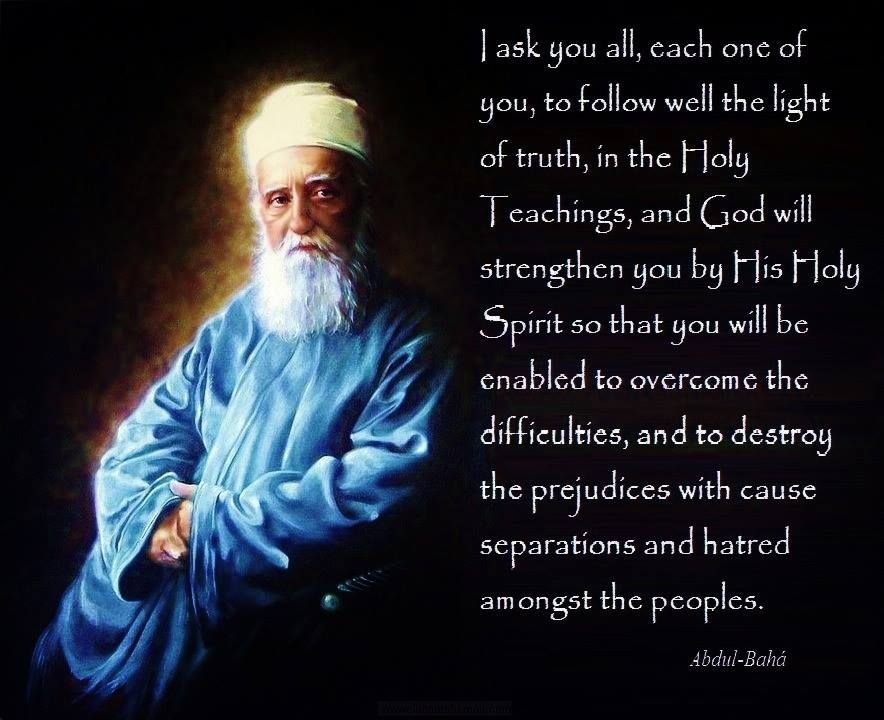The vibrant tapestry of Baha’i teachings intricately weaves together spiritual principles and practical guidance, beckoning individuals toward a life imbued with purpose and unity. Living the life of a Baha’i is akin to embarking on a profound journey, where every step resonates with the echoes of a higher calling. This exposition endeavors to elucidate the essence of this path, illustrating the manifold dimensions of a life rooted in these luminous teachings.
At the heart of Baha’i teachings lies the principle of unity. This foundational tenet posits that humanity, like a symphony, is composed of diverse notes, each contributing to the harmonious whole. To live as a Baha’i is to cultivate an ethos that transcends divisions—be they racial, national, or sectarian. This transformative perspective invites adherents to dismantle the barriers that divide peoples, fostering a spirit of solidarity. Just as a river gracefully merges its tributaries, so too must individuals strive to merge their unique backgrounds into a collective identity that celebrates shared humanity.
Moreover, the Baha’i teachings emphasize the pursuit of truth as an unassailable virtue. In an era often marked by disinformation and obfuscation, the Baha’i community ardently advocates for the examination of facts and the embrace of an open mind. To embody this principle entails a commitment to lifelong learning and an insatiable curiosity about the world. Much like a scholar embarking on a quest for knowledge, the Baha’i follower navigates a landscape replete with varied perspectives, striving to discern the underlying truths that unite all beings.
Integral to the Baha’i Faith is the concept of service. Living the life of a Baha’i means embracing the noble aspiration to serve others selflessly. This commitment to service can be visualized as a lighthouse guiding ships through turbulent waters, offering solace and direction. Acts of service—whether they are grand or modest—become the lifeblood of community life, engendering a spirit of cooperation and mutual respect. Baha’is are encouraged to partake in activities that advance social, economic, and spiritual development, recognizing that the well-being of one is inextricably linked to the well-being of all.
Additionally, the Baha’i writings inspire adherents to cultivate virtues that elevate the human spirit. These virtues—such as love, compassion, and justice—act as beacons illuminating the path toward moral refinement. Each individual is exhorted to engage in an introspective journey, purging negative traits and nurturing qualities that foster goodwill and understanding. Imagine a gardener tending to a flourishing plant; the nurturing of virtues is akin to this cultivation, ensuring that one’s inner landscape blooms with positivity and grace.
Equally, the integration of spiritual practices is paramount to the Baha’i way of life. Prayer and meditation form the cornerstone of this spiritual edifice, providing a sanctuary for the soul amidst the clamor of modern existence. These sacred practices, akin to a wellspring, allow devotees to reconnect with the Divine, drawing strength and inspiration from the Source. Regular engagement in such practices imbues life with depth and meaning, serving as a constant reminder of the higher realities beyond the material realm.
Moreover, the Baha’i commitment to gender equality is a hallmark of the Faith, advocating for the empowerment of women and the dismantling of discriminatory practices. This principle underscores the belief that progress is contingent upon the equitable participation of all individuals, regardless of gender. In this context, living the life of a Baha’i necessitates the active promotion of justice, ensuring that opportunities are accessible to everyone, thereby fostering a society rooted in equity and respect.
The Baha’i perspective on education further enriches its teachings. Education is venerated as a vital instrument for personal and societal transformation. The notion that “education is a source of both material and spiritual progress” resonates profoundly within Baha’i discourse, challenging individuals to pursue knowledge diligently. Lifelong education is viewed as a pathway to enlightenment, enabling individuals to contribute meaningfully to the betterment of humanity. Just as a master artisan hones their craft through continual practice, so too must individuals commit to their intellectual and spiritual development.
Additionally, the concept of collective consciousness pervades Baha’i thought. Baha’is recognize the interdependence of all people, akin to threads woven into a grand tapestry. Each person’s actions reverberate throughout the wider community. This awareness fosters a sense of responsibility, compelling individuals to act in ways that enhance societal well-being. Living the life of a Baha’i entails an acute understanding that one’s choices can illuminate or obscure the paths of others, thereby underscoring the importance of ethical decision-making.
In the final analysis, living the life of a Baha’i is an invitation to transcend self-interest and embark on a journey toward a collective vision of peace and prosperity. It is a life dedicated to the pursuit of truth, the cultivation of virtue, and the unwavering commitment to serve humanity. Embracing the Baha’i teachings equips individuals with the tools to navigate the complexities of modern life, fostering an existence that is rich in compassion, understanding, and love. Like a ship navigating uncharted waters, those who follow this path are guided by the luminous teachings of Baha’u’llah, steering towards a horizon of unity and enlightenment.
